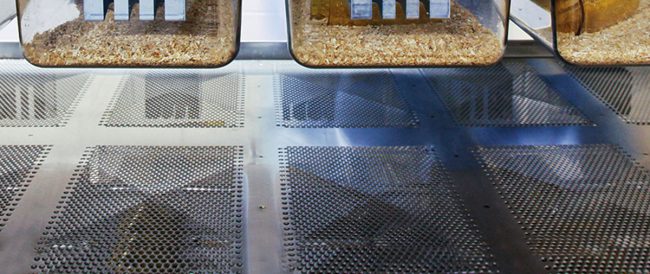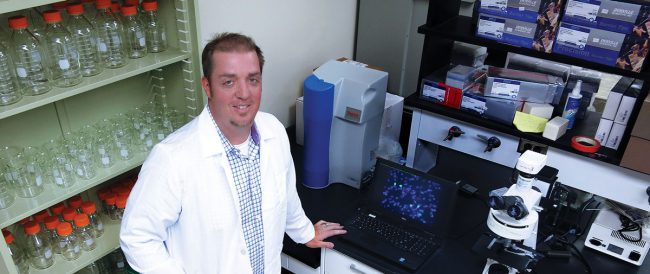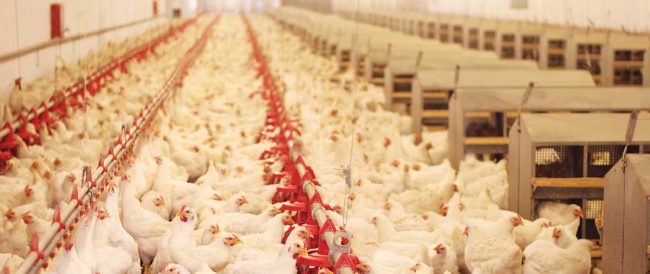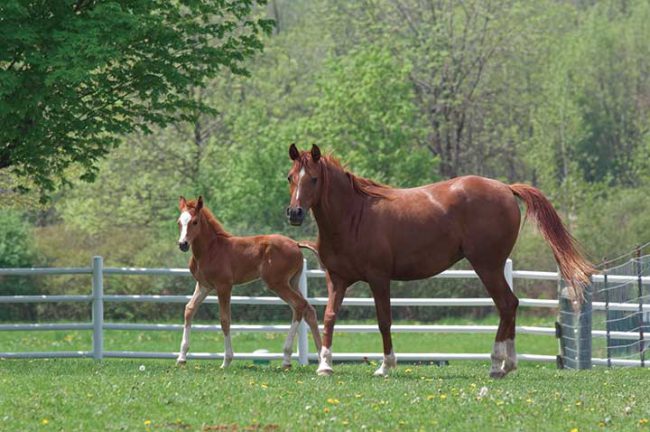 Read More
Read More
Update May 27, 2016: We are celebrating a successful three-day Executive Education Program for our Online MS in Food Safety students. Frank Yiannis, Vice President of Food Safety for Walmart, called our program "the best in the world."
Saving Lives and Expanding Access: Virtually
There are no students mingling or poring over books in the basement of the MSU Food Safety and Toxicology building, which is where the Online Master of Science in Food Safety Program is housed. Students of the program, many of them leaders in their fields, have developed their knowledge and expertise from desks in Fiji and France, Honduras and Hong Kong, and Jordan and Japan—from 23 countries and 42 US states in all.

More than 400 students have been accepted into the Online MS in Food Safety Program since the first course was offered in the fall of 2002. The average student is 35 to 40 years old, a mid-level career professional, and working in industry or government regulation. They come to the program to advance their food safety knowledge without having to leave their home communities and current jobs. These 400-plus students come from diverse geographies, but also from diverse professional backgrounds.
Protecting the safety of vulnerable populations
Mitzi Baum, a recent graduate from the program, is director of food safety for Feeding America. The organization spearheads the fight against hunger in the United States, providing 3.2 billion meals annually and leading an impressive empire of a network of more than 200 food banks nationwide.
Mitzi Baum wrote about her experience in the program in Taking Your Network to Work.
In April 2014, Baum and Feeding America were recognized for their commitment to food safety in the fight against hunger at the 2014 Food Safety Summit in Baltimore, Maryland.
In addition to receiving the award, Baum spoke at the Food Safety Summit’s session on food safety management. She described Feeding America’s comprehensive food safety measures, which ensure that each item in the 70 billion pounds of food donated annually is inspected for safety.
Baum credits the MS in Food Safety for inspiring the achievements for which she was recognized, as well as her vision for the future:
“My participation in the program has enabled me to create a food safety strategic vision for Feeding America, and this is providing me the opportunity to increase our food safety budget… The holistic approach of the program has inspired me with a food safety strategic vision for the entire [Feeding America] food bank network.”
Safety for more than just humans
Students in the program come from diverse geographies, but also from diverse professional backgrounds.
“Our students are great,” says Melinda Wilkins, DVM, MPH, PhD, director of the Online Master of Science in Food Safety Program and assistant professor in the Department of Large Animal Clinical Sciences.
“They love to share their knowledge and experience with each other and this fosters a really unique and collaborative atmosphere within the Program. I am always amazed by what I learn from them.”
Melody Foess Raasch, DVM, MS (’11), currently with Mars Petcare, was the manager of scientific communications at P&G Pet Care during her coursework, and conducted her master’s thesis on the impact of food safety certification statements on pet food packaging. She developed a tool that measured that impact.
For her research on pet food safety labeling, she was honored with the 2012 Edward and Mary Mather Food Safety Student Award.
Edward and Mary Mather Food Safety Student Award
“I am so pleased to receive this award and sincerely hope that my research will benefit the pet food industry and dogs and cats everywhere,” Raasch said, as she was presented the award from Mary Mather and Dr. Julie Funk, former director of the Online MS in Food Safety Program.
Dr. Funk commented, “Melody’s project stood out to the panel members as a very original project that was well executed and well-written. Above all, the project addressed a key issue for food safety, the safety of pet foods. Recent events regarding human illness associated with pet foods highlights the importance of safe animal feeds.”
2007 recipient of the award, Heather Farrell-Clarke, is food scientist and the quality assurance manager at Barbados Dairy Industries limited where she has spent the last twenty seven years in food science and food safety.
The award is given to a graduating student who demonstrates the values of practical research, education, and transdisciplinary learning in food safety, which has been the corner stone of the program.
This annual award is made possible through the support of Dr. Edward and Mrs. Mary Mather. Dr. Ed Mather was the founding director of the Online MS in Food Safety Program. He began offering online classes to students for the first time in fall of 2002. He took an active role in the program until his passing in 2010.
Lynn Swiech, Senior Manager Global Food Safety and Quality Systems at The Hershey Company, was the recipient of the 2009 Food Safety Student Award. In the time since she started the MSU Online MS in Food Safety, five Hershey’s employees have been students in the program. Because of their positive experiences and commitment to food safety, Lynn and seven others from The Hershey Company visited MSU’s campus in May, 2015, to continue to broaden their food safety expertise. They participated in Creating a Food Safety Culture Executive Education program featuring Frank Yiannas, Vice President of Food Safety and Health, Walmart, USA and hosted by the MSU Online MS in Food Safety. Thirty-four food safety professionals representing 6 countries and 22 organizations attended the event..
Leaders training leaders
From bioterrorism to food safety in Mexican street foods, master’s projects conducted by students reflect the breadth of their backgrounds and the expertise of faculty members.
Natasha Tahiera Lee (’11) researched effective management of food allergies in school.
Angela Lawless (’09) and Susan Linn (’09) researched supply chain communication during food recalls.
Frank McLaughlin (’07) researched the history, laws, detection, and surveillance to counter threats to the food supply posed by bioterrorism.
The Online MS in Food Safety Program’s transdisciplinary approach to protecting an increasingly complex food system is central to the improvement of public health.
An important component of the program is building a community of scholars that leverages all the knowledge of stakeholders, including alumni, academic leaders, government, and non-governmental organizations everyone who plays a role in food safety.
Faculty members come from a diverse pool of food safety experts. More than 20 members of the teaching roster represent Michigan State University, while another 10 or more share their expertise from other academic institutions.
Additional faculty members join the program from their positions within government and the food industry. Since most of the courses are team-taught, students are exposed to a comprehensive range of experience and knowledge.
In a world challenged by new and emerging threats, both natural and man-made, it is more important than ever to address concerns, such as food security, emerging foodborne pathogens, zoonotic disease, or biotechnology.
The Online MS in Food Safety Program is training professionals to be more effective, efficient, and confident in an ever-changing workplace.
“The food safety regulation landscape is currently undergoing a period of unprecedented change, so it’s a challenge to keep up to speed on the issues. Also, advances in technology and surveillance mean more and more food safety problems are being identified. We can’t teach our students everything, although we do try, so we really focus on developing their leadership and critical thinking skills along with the science,” says Wilkins.








